Key takeaways from President Pezeshkian’s visit to Iraq, first official foreign trip
By Maryam Qarehgozlou
Iran’s President Masoud Pezeshkian undertook a three-day visit to Iraq last week to pursue effective diplomacy and consolidate his predecessor’s neighborhood-friendly policy.
The trip which marked his first foreign visit since taking office in July also signaled Iran’s resolve to strengthen bilateral relations with its neighbors with Iraq as a strategic regional ally.
During his visit to the Arab country, Pezeshkian held talks with senior Iraqi leaders and signed multiple agreements to bolster cooperation between the two sides in various sectors.
He also visited Iraqi Kurdistan, the first-of-its-kind visit by an Iranian president, emphasizing the significance of joint efforts to improve security in the border region of Iran and Iraq.
The visit has been seen as an effort by Iran to bolster its strategic alliances at a time of heightened tensions in West Asia with the Israeli regime raging a genocidal war against Palestinians in the Gaza Strip and continuing its destabilizing acts in the region.
By forging closer ties with Iraq and other neighbors Iran hopes to promote stability and security in the region and collectively combat threats, including the menace of the Zionist occupation.
Iranian president calls for implementation of security deal with Iraqhttps://t.co/n0E8VD5Heg
— Press TV 🔻 (@PressTV) September 11, 2024
‘Muslim unity will root out Zionism’
During his visit to Iraq, Pezeshkian on multiple occasions called for unity among Muslims in the fight against terrorism and the Israeli regime’s genocidal atrocities against Palestinians.
On the first day of his visit, in his meeting with the Iraqi counterpart Abdul Latif Rashid in Baghdad, he urged the formation of the world’s Muslim countries union as a crucial step to combat “Zionist terrorism” and neutralize foreign sanctions effectively.
“The Muslim countries' unity is the key and the secret to rooting out Zionist terrorism,” he said.
Pezeshkian’s proposal highlighted the desire for greater cooperation and solidarity among Muslim countries in the face of shared threats and challenges posed most significantly by Israel, especially in Gaza where more than 41,000 Palestinians have been killed so far.
In a statement issued after the summit between high-ranking Iraqi and Iranian officials on Wednesday, both sides called for an end to the Gaza genocide. They urged the international community to bear responsibility for Israel’s horrendous war crimes in Gaza.
Iran and Iraq agreed that the Zionist regime is destabilizing the region and is undermining regional security.
In a joint press conference with Iraqi Prime Minister Mohammed Shia’ Al Sudani in Baghdad, Pezeshkian said the war on Gaza has “revealed the true face” of the Israeli regime and its Western allies who talk about international humanitarian laws but refuse to walk the talk when it comes to their ally in Tel Aviv.
As part of his three-day visit to Iraq, Iran's President Masoud Pezeshkian visited the site where Iran's top anti-terror commander, General Qassem Soleimani, and his Iraqi trenchmate, Abu Mahdi al-Muhandis, were killed in a US drone strike in 2020. pic.twitter.com/KshmlJX6dC
— Press TV 🔻 (@PressTV) September 11, 2024
Bolstering ties with Iraq
During President Pezeshkian’s visit to Iraq, the two countries also signed a significant number of bilateral cooperation agreements aimed at strengthening their historic ties.
A total of 14 memorandums of understanding (MoUs) were signed on Wednesday, covering a range of sectors including economic, energy, culture, agriculture, tourism, logistics, sports, and strategic partnerships.
During the joint press conference with Sudani, Pezeshkian said the agreements mark the beginning of expanded cooperation between the two nations and stated that specialized committees will be formed to implement them.
“We will adhere to the agreements and will strongly pursue them in Iran until they are implemented,” Pezeshkian said.
Prime Minister Sudani, for his part, described relations between Tehran and Baghdad as “deep” and “longstanding”, saying the proximity between the two countries can help in enhancing their relations.
Sudani also said the establishment of three border industrial areas in the provinces of Maysan, Jizan, and Basra, and an economic city, will significantly contribute to the expansion of ties.
“We reviewed the actions and activities of capable and powerful Iranian companies, especially those active in infrastructure. The more these partnerships increase, the more they will impact regional stability,” he said.
Presidents of Iran, Iraq’s Kurdistan region meet in Erbil, discuss key bilateral issues https://t.co/utlzradVvS
— Press TV 🔻 (@PressTV) September 12, 2024
A brighter future
Decades of war and the US occupation of Iraq, which is part of the dark baggage of the so-called “war on terror”, have left the Arab country’s infrastructure devastated.
At the same time, the successive administrations in Washington have tried to undermine relations between Iran and Iraq, pressuring the country to reduce its reliance on Iranian natural gas, which accounts for almost half of Iraq’s electricity generation.
The US has pressured Iraq to sever all connections with Iran, despite Iraq’s dependency on a wide range of Iranian imports, such as food, appliances, and car parts.
Due to a requirement imposed in 2003, Iraq must deposit all oil revenues into a single US bank account. With over $100 billion in reserves held in the US, Iraq relies on the United States’ goodwill to prevent potential sanctions on its oil revenues and finances.
The US is also leveraging Iraq’s vulnerability by weaponizing its dollar dependence against it, devaluing its currency, and obstructing payments, including debts owed to Iran for gas and other imports.
The current situation, however, is not sustainable. It is expected to undergo a significant shift once US troops withdraw from Iraq in September 2025 as reported, at which point Iraq will likely require Iran’s assistance in maintaining security and stability within its borders.
Iran and Iraq share their longest border together. This, as well as cultural and religious affinities between the peoples of the two countries, can significantly contribute to building better relations.
The shared border and cultural similarities help people from both countries better understand each other’s perspectives, values, and interests.
Shared religious affinities, such as the presence of Shia populations in both countries, can provide a basis for cooperation and understanding, particularly in areas related to religious tourism and interfaith dialogue.
Easier travel and interaction between the two countries can help also promote ties by facilitating trade, tourism, and investment, leading to greater economic interdependence and opportunities for growth for both nations.
Iran and Iraq can strengthen their economic ties by expanding trade and investment in key industries, such as energy, agriculture, and transportation.
As neighboring countries, Iran and Iraq face similar regional challenges, such as extremism, environmental issues, and political instability. Working together to address these challenges can also strengthen their bilateral ties.
Iran's President Masoud Pezeshkian arrives in neighboring Iraq on first state visithttps://t.co/ekFYToebwy
— Press TV 🔻 (@PressTV) September 11, 2024
Improved security
On the security situation in the border region, Pezeshkian called for the full implementation of the security deal between Iran and Iraq to confront terrorists and enemies who have targeted both Iran’s and the region’s stability and security.
He also noted that Iran-Iraq cooperation to combat Daesh terrorism and smuggling will expand.
Sudani, for his part, said Iraq’s soil must not be used to threaten Iran. He said his country opposes the expansion of tension and conflict and called on the international community to fulfill its legal and ethical responsibilities pertaining to Gaza.
Over the past decade, Iran has played a significant role in supporting Iraq in its fight against the Daesh terrorist group. Iran was the first country to pledge assistance to Iraq in its fight against the terrorist group.
Iran’s involvement included deploying its Islamic Revolution Guards Corps (IRGC) Quds Force, led by Major General Qassem Soleimani. Iran’s support was instrumental in assisting Iraqi forces in regaining territory from Daesh.
General Soleimani was assassinated in a US drone strike authorized by the then-US President Donald Trump in January 2020.
According to regional observers, Iran and Iraq can enhance border control measures, including monitoring and surveillance, to prevent the movement of terrorists, weapons, and illicit goods across their shared border.
Moreover, joint military exercises, training programs, and exchanges of expertise can strengthen both countries’ defense capabilities and help them address shared security challenges more effectively.
As part of his three-day visit to Iraq, Iran's President Masoud Pezeshkian visited the site where Iran's top anti-terror commander, General Qassem Soleimani, and his Iraqi trenchmate, Abu Mahdi al-Muhandis, were killed in a US drone strike in 2020. pic.twitter.com/KshmlJX6dC
— Press TV 🔻 (@PressTV) September 11, 2024
Improved economic cooperation
In a meeting in Baghdad with business owners and economic figures from both countries, Pezeshkian said the visit to Iraq mainly aimed to facilitate trade and investment for Iranians in the Arab country.
Iran and Iraq also agreed to set up a task force to discuss a comprehensive agreement that could further boost economic and trade relations between the two countries.
According to Pezeshkian, improved economic and trade relations between Iran and Iraq would positively impact the security situation in the region.
Annual trade between Iran and Iraq is estimated at $12 billion while Iran is a major supplier of natural gas and electricity to its western neighbor.
The Trade Promotion Organization of Iran (TPO) said last week that Iranian exports to Iraq had reached nearly $4.5 billion in the five months to August 21, up 21 percent compared to the same period last year.
The TPO said exports to Iraq could hit a multi-year record this year as he estimated that shipments could reach well beyond $10 billion in the year to March.
Iraq has been the second largest importer of Iranian goods and products after China in recent years. Iranian exports to Iraq mainly include natural gas, steel, petrochemical products, construction materials, and food.
According to Samad Hassanzadeh, head of the Iran Chamber of Commerce, Industries, Mines and Agriculture (ICCIMA), the annual trade between Iran and Iraq can reach $20 billion.
He encouraged Iranians to invest in sectors like agriculture, petrochemicals, and glass, plastic, footwear and clothing markets.
Presidents of Iran, Iraq’s Kurdistan region meet in Erbil, discuss key bilateral issues https://t.co/utlzradVvS
— Press TV 🔻 (@PressTV) September 12, 2024
Iran’s first official visit to Iraq’s Kurdistan region
Pezeshkian arrived in the capital of the Kurdistan Region of Iraq on Thursday, the second day of his three-day visit to Iraq, and was welcomed by his counterpart Nechirvan Barzani upon his arrival.
Pezeshkian expressed Iran’s keenness to boost economic and trade cooperation with the Kurdistan region of Iraq.
“It is essential to improve cooperation to prepare the necessary security ground for enhanced economic and commercial relations and interactions, especially in the border areas,” he said.
Barzani, for his part, said Kurdistan imported more than 50 percent of its required commodities from Iran, expressing hope that the two sides will accelerate the expansion of their interaction.
Elsewhere, Barzani stated that the Kurdistan region is committed to a security pact between Iran and Iraq and will never allow any side to use it as a threat against the Islamic Republic.
“Imam Khomeini, the founder of the Islamic Revolution, and Iran’s revolution re-established our identity, and for that we owe you, we will never be a threat to Iran, rather we will be an opportunity for the Islamic Republic,” Barzani was quoted as saying.
Iraq’s Kurdistan region, which shares a border with Iran, has become a haven for terrorist groups that often launch attacks on Iranian soil and allow external forces to target the Islamic Republic.
The region has become a stronghold of terrorists and separatists seeking to harm Iran.
Terrorist groups operating in northern Iraq against Iran include the so-called Komala Party, the Democratic Party of Iranian Kurdistan (PDKI), the Kurdistan Freedom Party (PAK), the Kurdistan Free Life Party (PJAK), and Khabat.
They often cooperate as a network and are connected to other similar groups. The PJAK is affiliated with the Kurdistan Workers’ Party (PKK) which operates in Turkey, and Khabat has close ties with the Albania-headquartered Mujahedin-e-Khalq (MKO) terror cult.
Iranian forces have many times launched aerial strikes at terrorist positions in the region and repeatedly warned the authorities in Baghdad and Erbil to act against the groups backed by the US and Israel.
On March 19, 2023, Iran and Iraq signed a security agreement in Baghdad encompassing coordination in protecting the shared border.
Under the agreement, the Iraqi government had promised to disarm terrorist and separatist groups based in the Kurdistan region by September 19, 2023, vacate their military barracks, and transfer them to the camps established by the Baghdad government.
Iraqi Foreign Minister Fuad Hussein claimed on September 23, 2023, that his country has implemented all clauses of the security agreement.
'This is cruelty, not war,' Pope Francis slams Israel's brutality against Gaza children
IRGC intelligence forces bust Takfiri terrorist team in western Iran
Syria’s de facto new ruler names Asaad al-Shibani as foreign minister
How 8-year-old Lebanese child Fawaz nixed Ben Gurion’s 76-year-old fallacy
VIDEO | 700,000 Cubans rally at US embassy in Havana against trade embargo
Iranian embassy staffer assassinated by terrorists in Damascus
VIDEO | Press TV's News Headlines
Scandalous detention of Iranians by US to extort information


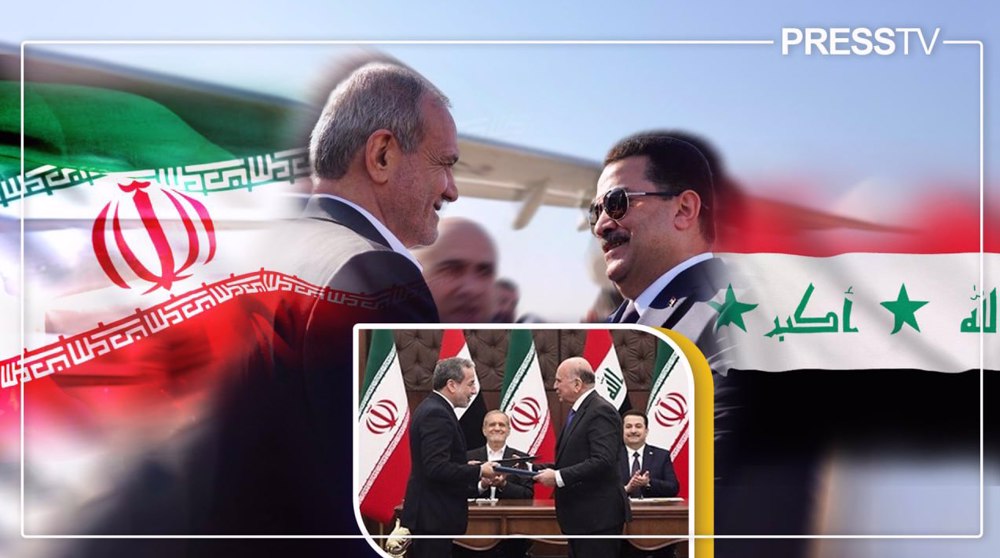
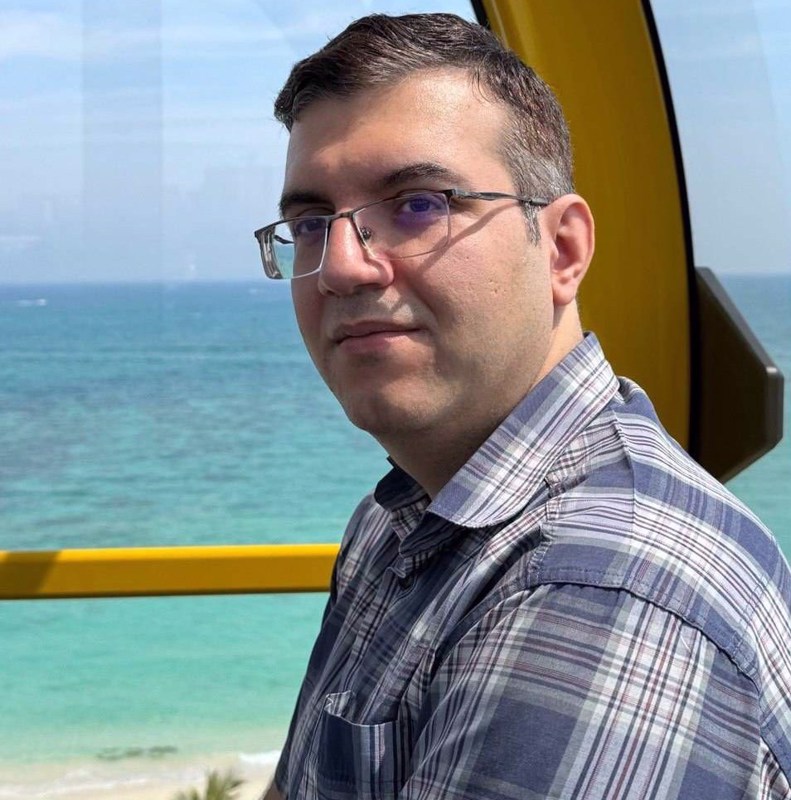
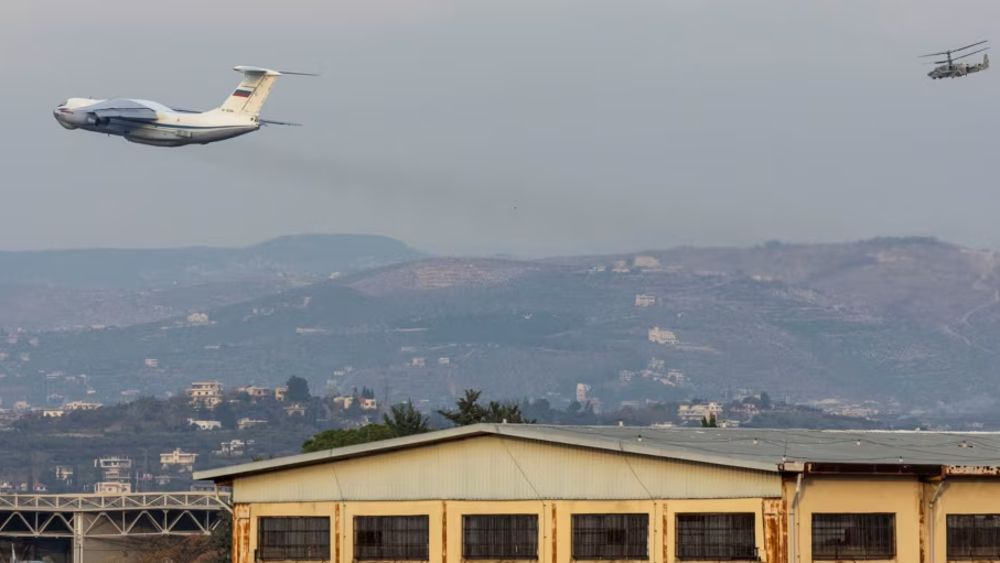
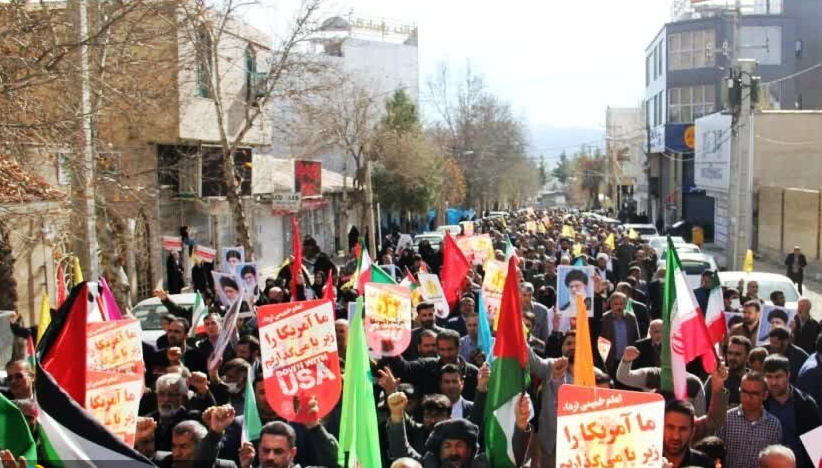



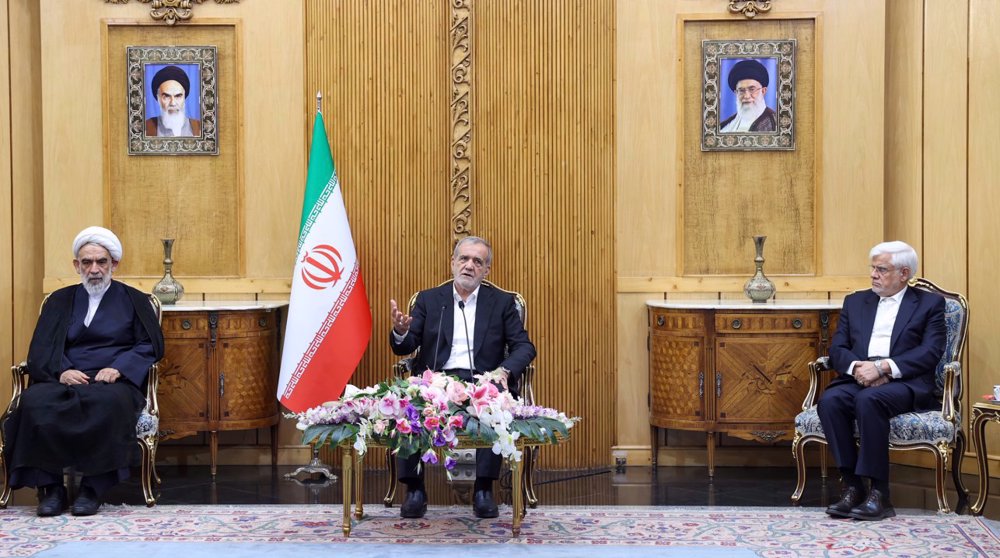
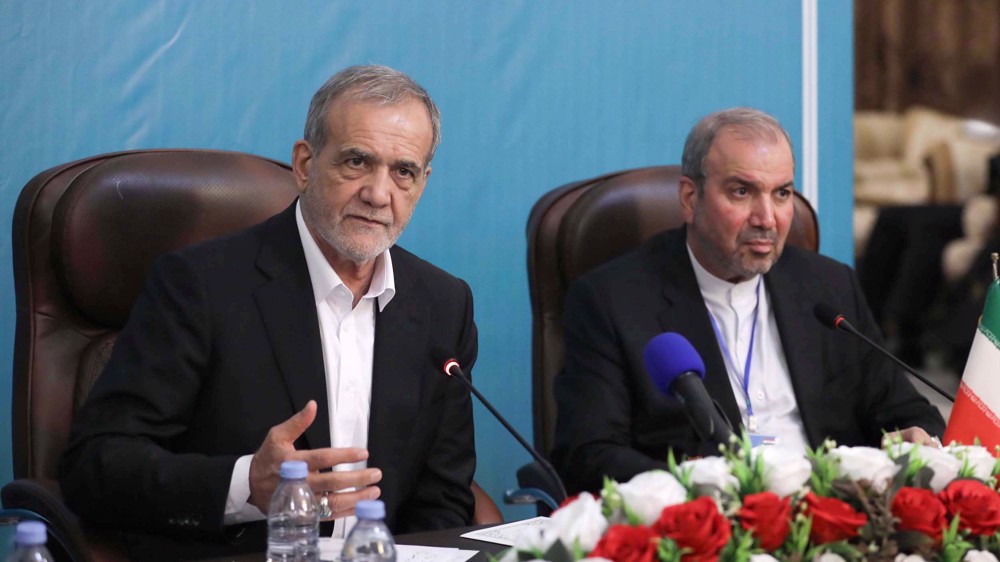
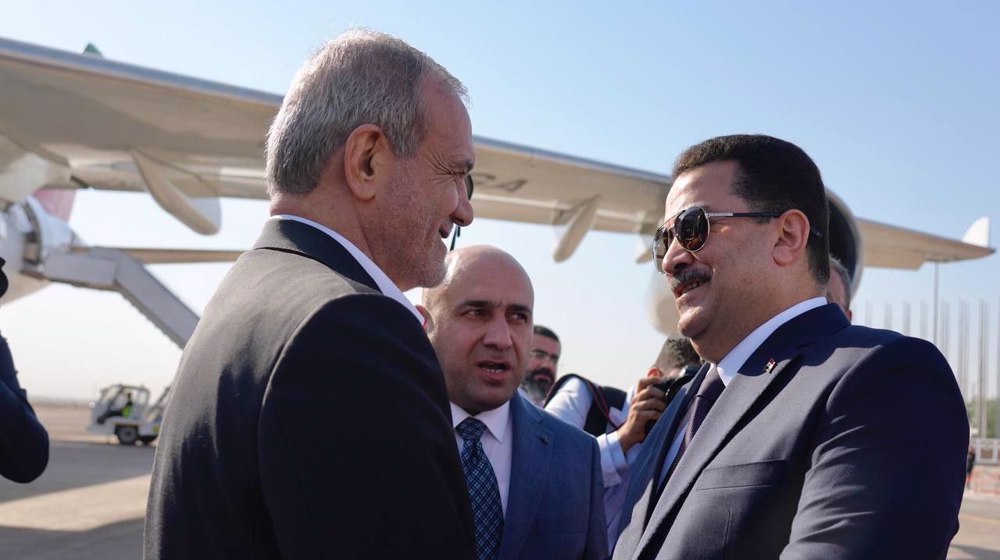
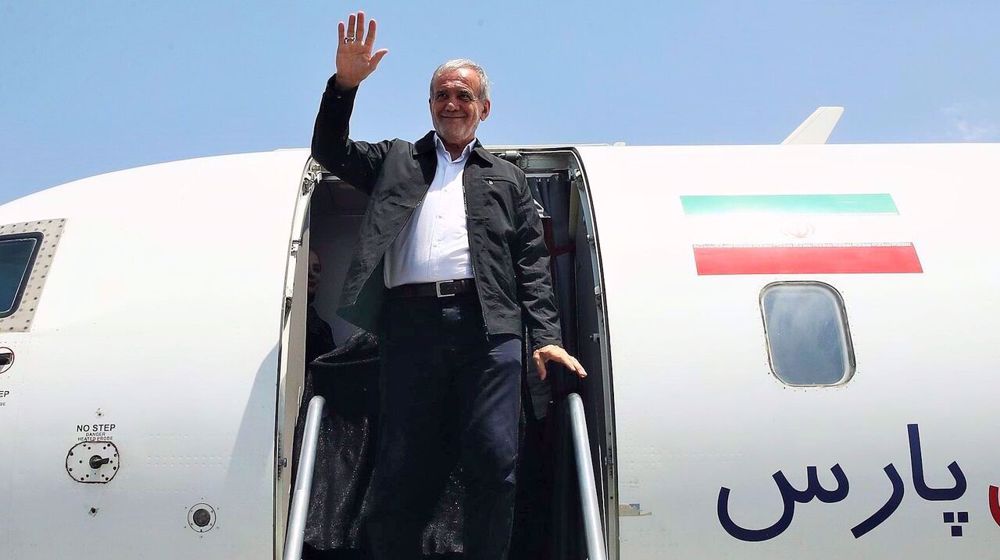
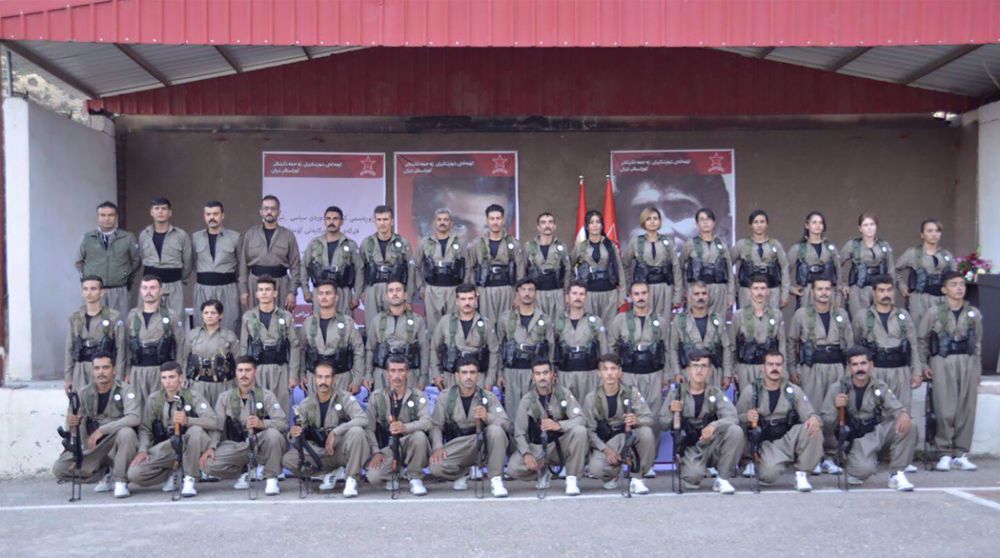

 This makes it easy to access the Press TV website
This makes it easy to access the Press TV website